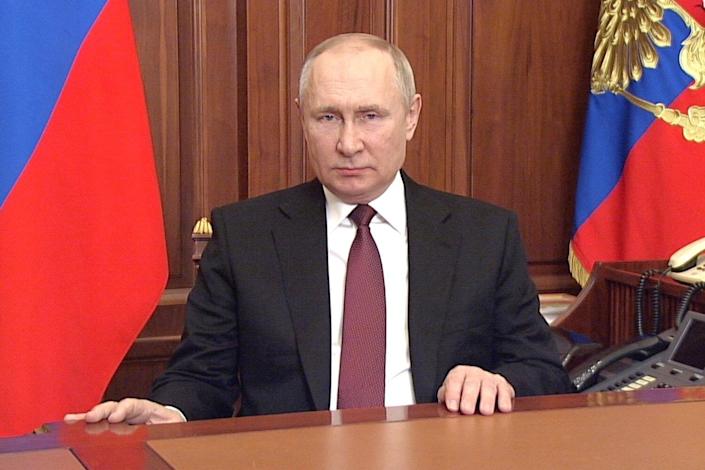
RUSSIAN PRESIDENT PRESS SERVICE/HANDOUT/EPA-EFE/Shutterstock Russian President Vladimir Putin
President Vladimir Putin is thought to be fuming and frustrated about the state of Russia’s invasion of Ukraine but he is likely only to double down on that widely denounced aggression, top U.S. intelligence officials told lawmakers on Capitol Hill on Tuesday.
In testimony before the House Intelligence Committee, the officials gave their first public assessment of the war that began Feb. 24 — sharing their agencies’ insights into Putin’s planning missteps, mood and what he may do next as his forces face fiercer-than-expected defenses.
“Moscow underestimated the strength of Ukraine’s resistance and the degree of internal military challenges we are observing, which include an ill-constructed plan, morale issues and considerable logistical issues,” Director of National Intelligence Avril Haines said at the hearing.
Despite those setbacks, Haines said the Russian leader was “unlikely to be deterred” and “instead may escalate, essentially doubling down” to achieve his goals.
Putin has insisted he invaded in the name of so-called “peacekeeping” and is supporting separatist regions of Ukraine. He says the country has historic ties to Russia.
William Burns, director of the Central Intelligence Agency, said Tuesday he believes Putin is “angry and frustrated” about the progress Russia has made after Putin initially expected to take over Ukraine’s capital, Kyiv, within the first two days of invading, according to intelligence assessments.
“He was confident that he had modernized his military and they were capable of quick, decisive victory at minimal cost. He’s been proven wrong on every count,” Burns said. “Those assumptions have proven to be profoundly flawed over the last 12 days of conflict.”
Still, Burns said he expects Putin will intensify attacks as he tries to “grind down the Ukrainian military with no regard for civilian casualties.”


Anastasia Vlasova/Getty Images
The CIA director also said he anticipated an “ugly next few weeks” as the war rages on.
Haines described Putin’s military campaign, which international officials say has killed or wounded more than 1,200 civilians and sent more than 2 million Ukraine residents — including a million children — fleeing across its borders, as a “war he cannot afford to lose.”
“But what he might be willing to accept as a victory may change over time given the significant costs he is incurring,” Haines added before the congressional committee.
RELATED: ‘They’ve Gone Through Hell’: Stories of Humanity and Discrimination at Ukraine’s Border
Lt. Gen. Scott D. Berrier, director the Defense Intelligence Agency, estimated up to 4,000 Russian troops have died so far in two weeks of fighting.
Another factor in how the invasion will play out is support for Putin among the Russian public.
Information is tightly controlled in Russia and there are signs of support for the ongoing attack, so it will likely take time for the public to “absorb the consequences” Putin’s decision to go to war, Burns said, adding that over time funerals for Russian soldiers killed in Ukraine could erode positive opinion.
Before the war began, President Joe Biden‘s administration chose to reveal intelligence on Putin’s plans in real time, hoping to prevent or complicate execution and to build advanced support for the debilitating economic sanctions now imposed by many countries on Russia.


Sergei Malgavko/TASS/Getty
Haines said that the intelligence community will continue to expose Russia atrocities — like attacks on civilians — as a strategy in the information war but also to document possible war crimes. (Russia has repeatedly denied targeting civilian sites.)
“Russian forces are at the very least operating with reckless disregard for the safety of noncombatants, as Russian units launch artillery and airstrikes into urban areas as they have done in cities across Ukraine,” Haines said.
RELATED: More Than 1,200 Civilian Casualties Recorded in Ukraine amid Russian Invasion, U.N. Says
Berrier cited the bombing of schools and other non-military targets in Ukraine as indication that Putin “is stepping up right to the line” if he hasn’t already committed acts that would be considered war crimes.
He also spoke of Russia’s reported attempts to cut off food and water supplies to Kyiv. He couldn’t say precisely how long the city could last with current stores but said the situation “will become somewhat desperate in 10 days to two weeks.”
When a lawmaker on the committee asked if the Russian leader was “crazy,” Burns said he didn’t think so.
“He’s far more insulated from other points of view and people who would challenge or question his views,” Burns replied. “But in my opinion that doesn’t make him crazy, but it makes them extremely difficult to deal with because of the hardening of his views over time and a narrowing of his inner circle.”




